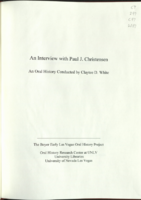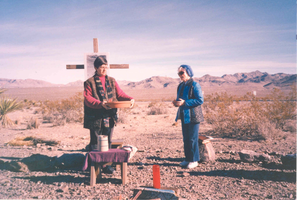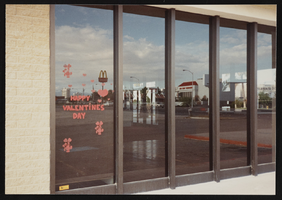Search the Special Collections and Archives Portal
Search Results

Transcript of interview with Samuel and Sherrill Coleman by Claytee White, February 12, 2016 and February 22, 2016
Date
Archival Collection
Description
Sherrill and Samuel Coleman moved to Las Vegas during the 1990s after both enjoying a full life and numerous careers in other parts of the United States. They met each other through church in 1998 and married each other in April 1999. Now retired, both Samuel and Sherrill remain active in their church community. Samuel Coleman was born in Durant, Mississippi in 1928 to a sharecropping family. His father died when he was 13 months old, leaving his mother to raise seven children by herself. Over time, his family slowly migrated to Chicago and he joined them when he was 15. For eight months, Samuel worked a number of different jobs until he began to work for Burlington Railroad as a four cook. The United States Army drafted him in 1951 and sent him overseas to work in a motor pool for a military hospital in Korea, despite his status as a conscientious objector. At war’s end, he returned to work for Burlington. During his last 17 years with the railroad, Samuel successfully petitioned to join the Brotherhood of Sleeping Car Porters, the union for railroad cooks, porters, and waiters, to improve the working and sleeping conditions at Burlington Railroad. He retired from the railroads in the 1970s and chose to pursue other careers. Until his official retirement in 1993, Samuel worked in real estate, as the owner of a liquor store, a firefighter, a restaurant inspector, and a deacon for his church. His daughter from his first wife moved to Vegas to pursue a career as a teacher and after a number of visits, Samuel decided to follow her in 1999. Sherrill Coleman was born in Newton, Kansas in 1941. Like many other African American women in her community, she worked as a housekeeper for a number of years. She and her first husband moved to Los Angeles County in 1964 where she took a temporary job in the elections department of the local government. In 1967, Sherrill became a file clerk for Los Angeles County’s Department of Public Social Services. By the time she left the department, she was middle management in the auditing department. She moved to Vegas in 1993.
Text

Transcript of interview with Paul J. Christensen by Claytee D. White, February 19, 2008
Date
Archival Collection
Description
Text
Charlotte Brascia oral history interview
Identifier
Abstract
Oral history interview with Charlotte Brascia conducted by Joe Mascellino on February 24, 1977 for the Ralph Roske Oral History Project on Early Las Vegas. Mascellino asks Brascia about social and cultural changes, the growth of different religions, Brascia’s brief presence in the airline industry, political presence in Las Vegas, Nevada, and rising crime rates. Brascia also specifically discusses her experience in the gaming and hospitality industry and how gaming operations have changed over time, particularly comparing gaming and hiring practices in the 1950s with those in the 1970s.
Archival Collection
Robert N. Broadbent oral history interview
Identifier
Abstract
Oral history interview with Robert N. Broadbent conducted by Connie Lyons on September 23, 1972 for the Ralph Roske Oral History Project on Early Las Vegas. During the interview Broadbent discusses education, politics, religion, entertainment, the dedication of Hoover Dam, and the various social clubs of which he is a member of. Broadbent also discusses Six Companies, housing in Boulder City, Nevada, the Las Vegas Strip, Railroad Pass, the Union Pacific Railroad, and the above ground atomic bomb testing in Nevada.
Archival Collection

Jewish Federation correspondence, meeting minutes, and other records, item 05
Description
A letter about local allocations from Hal Ober to the Board of Directors of the Jewish Federation of Las Vegas, Nevada. May 20, 1986.

Sister Rosemary Lynch and an unidentified protestor on Ash Wednesday: photographic print
Date
Archival Collection
Description
Image

The Evangelism Training Center: photographic prints
Date
Archival Collection
Description
Image
Tyrone L. Seals oral history interviews
Identifier
Abstract
Oral history interviews with Tyrone L. Seals conducted by Claytee D. White and Sarah Beth Hawkins on April 25, 2016 and May 16, 2016 for the African Americans in Las Vegas: a Collaborative Oral History Project. In the first interview, Seals discusses his upbringing in Las Vegas, Nevada and growing up in the Westside. He talks about experiencing discrimination, employment limitations, and entertainment on Jackson Street. In the second interview, Seals remembers school integration, organizations for African American women, and protests during the 1960s. Lastly, Seals discusses the significance of religion in the African American community and becoming a pastor.
Archival Collection
Maria Banks oral history interview
Identifier
Abstract
Oral history interview with Maria Banks conducted by Barbara Hoyt on September 23, 1972 for the Ralph Roske Oral History Project on Early Las Vegas. Banks discusses her experiences managing a jukebox company, owning and operating two restaurants, and working for a music company. She also discusses her Mormon religion and the relationship she had with her late husband. Banks also discusses the change in climate over time, specifically the increasing humidity.
Archival Collection
Pat Spearman oral history interview
Identifier
Abstract
Oral history interview with Pat Spearman conducted by Lisa McAllister on March 03, 2016 for the African Americans in Las Vegas: a Collaborative Oral History Project. In this interview, Spearman discusses her experiences in the military and becoming a minister at United Methodist Church in Las Vegas, Nevada. She describes what it was like to serve in the military as a gay woman and telling church members about her sexuality. Spearman then talks about the African American gay community in Las Vegas and the intersectionality of race, class, religion, sexuality, and politics. Lastly, Spearman discusses her plans to get re-elected as a Nevada State Senator.
Archival Collection
